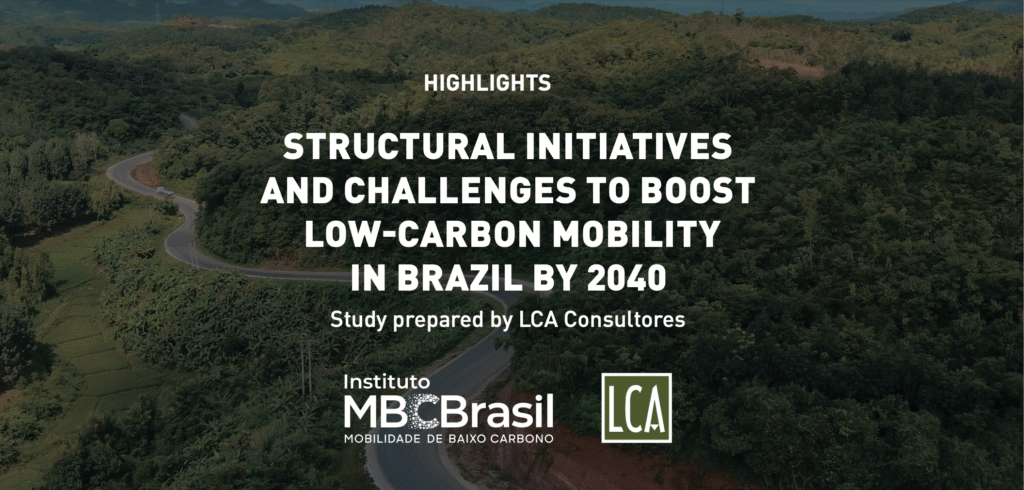New MBCBrasil Institute Study Projects Transformative Demand for Biofuels and Electrification by 2040
04/11/2025
The MBCBrasil Institute releases an unprecedented study outlining the structural challenges that will shape sustainable mobility pathways in Brazil through 2040, in a context of new climate commitments and the projected expansion of the Fuel of the Future Program and the Energy Transition Acceleration Program (PATEN). The report, “Initiatives and Structural Challenges to Accelerate Low-Carbon Mobility in Brazil by 2040,” goes beyond mapping technology routes for decarbonization. It provides a systemic assessment of the structural conditions required for Brazil to guarantee the supply of biofuels and the deployment of electrification infrastructure over the next 15 years. The study also highlights the heavy-duty transport sector as a strategic opportunity for developing innovative solutions supported by coordinated public policies, adequate infrastructure, and regulatory predictability.
Developed by LCA Consultores, the study shows that the share of electrified vehicles in Brazil’s circulating fleet is expected to increase 44-fold by 2040, driven largely by hybrid technologies—which should represent 72% of the electrified fleet—and by policies supporting low-carbon mobility and infrastructure expansion. In light-duty vehicles, flex-fuel engines remain relevant, but electrification will advance rapidly, reaching an estimated 17.4 million units by 2040, representing more than 27% of the national fleet. The study highlights the strategic role of hybrid-flex (bioelectric) vehicles—an innovation developed in Brazil—which will comprise most of the hybrid fleet, consolidating an efficient technological pathway aligned with the country’s competitive advantages. The projections depict a transition already underway, marked by technology diversification and the consolidation of multiple routes toward more sustainable and accessible mobility.
For the MBCBrasil Institute, the central challenge is converting this technical potential into structural outcomes. The Institute underscores that the success of low-carbon mobility depends on the convergence of technological innovation with well-coordinated public policies. “Brazil holds unique conditions to lead an efficient and inclusive energy transition—one capable of aligning economic growth with environmental sustainability. The advancement of new technologies and the strengthening of biofuels demonstrate that reducing emissions while expanding development opportunities is not only possible, but strategic,” states José Eduardo Luzzi, President of the MBCBrasil Institute.
Biofuels as a Strategic Advantage
According to the study, biofuels play a strategic role in Brazil’s energy transition. Ethanol—highlighted as one of the country’s key competitive assets—may see demand increase by up to 2.4 times by 2040, driven both by domestic consumption and the opening of new international markets. This expansion will be particularly significant due to the growing use of ethanol as a feedstock for Sustainable Aviation Fuel (SAF) and for maritime transport. Together, these segments could reach by 2040 a volume nearly equivalent to 80% of total Otto-cycle ethanol demand recorded in 2025.
The study emphasizes, however, that despite rising demand for SAF and maritime shipping, ethanol supply will remain robust, supported by gains in sugarcane productivity and by the rapid expansion of corn-based ethanol. These developments ensure sufficient supply for road transport while reinforcing Brazil’s position as a global supplier of clean energy.
To support this growth, the sugar-energy sector is investing in technological innovation, with genetic and biotechnological advances capable of doubling sugarcane productivity by 2040—strengthening both competitiveness and the sustainability of supply. Corn ethanol is also emerging as a key vector of energy security and diversification, expanding from 7.6 billion liters in 2024 to as much as 25 billion liters by 2040, enhancing the country’s ability to meet growing global demand for renewable fuels.
Biomethane: A New Vector for the Transition
Among clean energy sources, biomethane stands out as one of Brazil’s greatest opportunities for decarbonizing transport and strengthening national energy security. Produced from agro-industrial waste, biomethane has the potential to replace up to 70% of diesel consumption in heavy-duty freight transport by 2040—a significant step toward emissions reduction and lower logistics costs.
According to LCA Consultores, the expansion of biomethane could foster new regional development hubs, particularly in areas linked to agriculture and the sugar-energy sector. Harnessing Brazil’s estimated production potential—up to 120 million cubic meters per day—reinforces the country’s position as a global reference in renewable energy.
“The projections indicate that the marginal cost of decarbonization in transport is optimized when the country leverages already-established routes while gradually introducing emerging technologies such as biomethane. This combination reduces risk and enables a more stable investment trajectory for the sector,” explains Fernando Camargo, Managing Partner at LCA Consultores.
The Future of Freight Transport
The heavy-duty segment is advancing rapidly in the adoption of lower-emission solutions. Although internal-combustion trucks will still represent about 85% of the fleet, the study shows strong growth in alternatives such as biomethane and battery-electric vehicles (BEVs), which together are expected to account for 15% of the fleet by 2040. Decarbonization in this segment will occur through multiple technological routes. For the majority diesel-powered fleet, biofuel policies remain essential, with blending mandates projected to reach B20 in the baseline scenario and B25 in the alternative scenario—supporting a gradual, consistent transition that maintains national energy security.
The expansion of electric mobility in Brazil will require investments of R$ 25 billion by 2040 solely for charging infrastructure. With an electricity matrix that is 88% renewable, an established biofuels industry, and a strong manufacturing base, Brazil is equipped to scale these solutions in a coordinated and efficient manner. The study proposes a set of necessary and consistent public policies to overcome structural challenges and ensure that the country meets its energy-security and decarbonization goals. Action must begin now.
About the MBCBrasil Institute
The MBCBrasil Institute is a multisectoral organization dedicated to accelerating the decarbonization of mobility in Brazil. Created through the union of companies, industry associations, research institutions, and workers, the Institute’s mission is to translate technical evidence into public policies and promote sustainable mobility solutions. Its work focuses on enabling a viable decarbonization pathway, advancing bioelectricity-related technologies, and supporting a just and inclusive energy transition.
Guided by technological neutrality, the Institute encourages the integration of biofuels, electrification, and new renewable sources—strengthening industrial competitiveness and driving job creation, income generation, and innovation while positioning Brazil as a global leader in the energy transition.
For more information, visit our website and follow the MBCBrasil Institute on LinkedIn and Instagram.
Press Contact
Adriana Monori
+55 61 99999-1900
mbcbrasil@maquinacw.com

